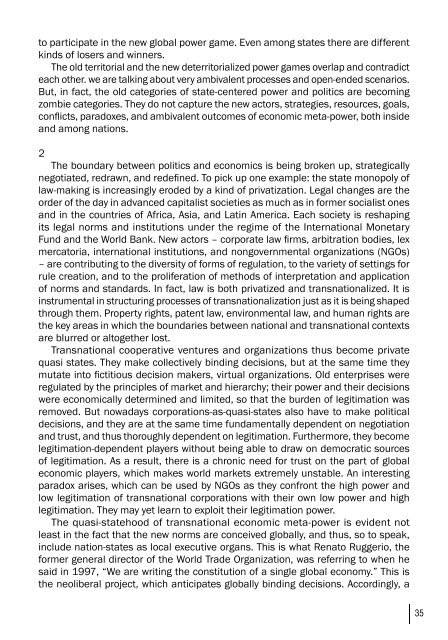art-e-conomy _ reader - marko stamenkovic
art-e-conomy _ reader - marko stamenkovic
art-e-conomy _ reader - marko stamenkovic
You also want an ePaper? Increase the reach of your titles
YUMPU automatically turns print PDFs into web optimized ePapers that Google loves.
to p<strong>art</strong>icipate in the new global power game. Even among states there are different<br />
kinds of losers and winners.<br />
The old territorial and the new deterritorialized power games overlap and contradict<br />
each other. we are talking about very ambivalent processes and open-ended scenarios.<br />
But, in fact, the old categories of state-centered power and politics are becoming<br />
zombie categories. They do not capture the new actors, strategies, resources, goals,<br />
conflicts, paradoxes, and ambivalent outcomes of economic meta-power, both inside<br />
and among nations.<br />
2<br />
The boundary between politics and economics is being broken up, strategically<br />
negotiated, redrawn, and redefined. To pick up one example: the state monopoly of<br />
law-making is increasingly eroded by a kind of privatization. Legal changes are the<br />
order of the day in advanced capitalist societies as much as in former socialist ones<br />
and in the countries of Africa, Asia, and Latin America. Each society is reshaping<br />
its legal norms and institutions under the regime of the International Monetary<br />
Fund and the World Bank. New actors – corporate law firms, arbitration bodies, lex<br />
mercatoria, international institutions, and nongovernmental organizations (NGOs)<br />
– are contributing to the diversity of forms of regulation, to the variety of settings for<br />
rule creation, and to the proliferation of methods of interpretation and application<br />
of norms and standards. In fact, law is both privatized and transnationalized. It is<br />
instrumental in structuring processes of transnationalization just as it is being shaped<br />
through them. Property rights, patent law, environmental law, and human rights are<br />
the key areas in which the boundaries between national and transnational contexts<br />
are blurred or altogether lost.<br />
Transnational cooperative ventures and organizations thus become private<br />
quasi states. They make collectively binding decisions, but at the same time they<br />
mutate into fictitious decision makers, virtual organizations. Old enterprises were<br />
regulated by the principles of market and hierarchy; their power and their decisions<br />
were economically determined and limited, so that the burden of legitimation was<br />
removed. But nowadays corporations-as-quasi-states also have to make political<br />
decisions, and they are at the same time fundamentally dependent on negotiation<br />
and trust, and thus thoroughly dependent on legitimation. Furthermore, they become<br />
legitimation-dependent players without being able to draw on democratic sources<br />
of legitimation. As a result, there is a chronic need for trust on the p<strong>art</strong> of global<br />
economic players, which makes world markets extremely unstable. An interesting<br />
paradox arises, which can be used by NGOs as they confront the high power and<br />
low legitimation of transnational corporations with their own low power and high<br />
legitimation. They may yet learn to exploit their legitimation power.<br />
The quasi-statehood of transnational economic meta-power is evident not<br />
least in the fact that the new norms are conceived globally, and thus, so to speak,<br />
include nation-states as local executive organs. This is what Renato Ruggerio, the<br />
former general director of the World Trade Organization, was referring to when he<br />
said in 1997, “We are writing the constitution of a single global e<strong>conomy</strong>.” This is<br />
the neoliberal project, which anticipates globally binding decisions. Accordingly, a<br />
35


